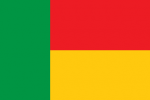Vasca
 |
"Autonom e Libria Eterna" |
| Area: | 388 km² (149 mi²) |
| Population: | ~508,000 |
| Capital City: | Porto Baia |
| Current Monarch: | Prinse Grande Benato II |
| Current Prime Minister: | Jerardo Belarosa |
| Official Language: | Elefen |
| Minority Languages: | Spanish, French, English, Arabic |
| Predominant Religion: | Roman Catholic (88.4%) |
Vasca (or Isola de Vasca) is an island nation (fictional) situated about 700km northwest of Spain, on the outer edges of the Bay of Biscay. The official language of Vasca is Lingua Franca Nova (sometimes simply referred to as Elefen). Due to its size and geopolitical obscurity Vasca is considered one of the European microstates.
Etymology
The origin of the name Vasca is not entirely clear but seems to have derived from the Vascones tribe. The Spanish word vasca is used to refer to female Basque.
History
Politics
Administrative Districts
The counties of Vasca (listed alphabetically):
- Bejeta
- Braga
- Delenio
- Franconia
- Goros
- Masada
- Mosta, La feudo de
- Ordino
- La Roca
- Sanat
- Verona
Government
It is a Parliamentary Monarchy. Vasca has a constitutional monarch as Head of State, and an elected parliament which enacts law. It is also a direct democracy, where voters can propose and enact constitutional amendments and legislation independent of the legislature. The current monarch is Prinse Grande Benato II (Grand Prince Bernard the 2nd)
The reigning Prince is the head of state and represents Vasca in its international relations. The Prince may veto laws adopted by parliament. The Prince can call referenda, propose new legislation, and dissolve parliament, although dissolution of parliament may be subject to a referendum.
Geography
- See also: La Jeografia de Vasca
The island is approximately 388 km² (149 mi²). The capital of Vasca is Porto Baia (Bay Port). The two minor islands are called Vilamina (to the northwest) and Bacari (to the south).
The largest metropolitan areas on the island are (listed by size):
- Porto Baia (political capital)
- Marapas (also called Pas de la Mar)
- Omieda (a remnant of the Umayyad Caliphate)
- Navaro
- Beria
- Acita
- Capo Arena
- Raial
Economy
Demographics
Vasca conducts a census of population and housing every ten years. The census held in November 2005 counted an estimated 96% of the population. Native Vascans make up the majority of the island. However, there are minorities, the largest of which are French, many of whom are retirees. The population of Vasca as of July 2011 was estimated at 508,000. The population's age composition is similar to the age structure prevalent in the EU. Since 1977 there was observed a trend indicating an aging population, and is expected to continue in the foreseeable future. Vascan legislation recognizes both civil and canonical (ecclesiastical) marriages. Annulments by the ecclesiastical and civil courts are unrelated and are not necessarily mutually endorsed.
Languages
~93% of the population speak Elefen, minority languages include, Spanish, French, Basque, and English. Lingua Franca Nova (Elefen) is the constitutional national language of Vasca, having become official, however, only in 1834. Previously, Spanish was the official and cultural language of Vasca. Alongside Elefen, Spanish (imposed by Spain after 1800) is also an official language of the country and hence the laws of the land are enacted both in Elefen and Spanish. However, the Constitution states that if there is any conflict between the Elefen and the Spanish texts of any law, the Elefen text shall prevail. The Constitution also provides for the introduction of another official language; this is due to the prevalence of English in international law and business.
Education
Schools
Children between the ages of 6 and 16 are required by law to have full-time education. Education up to secondary level is provided free of charge by the government.
There are three systems of schools – Elefen, French, and Spanish – which use Elefen, French, and Spanish, respectively, as the main language of instruction. Parents may choose which system their children attend. All schools are built and maintained by Vascan authorities, but teachers in the French and Spanish schools are trained for the most part by France and Spain. About 50% of Vascan children attend the Spanish primary schools, and the rest attend Vascan schools.
University of Marapas
La Universia de Marapas is the state public university and is one of only two universities in Vasca. It was established in 1977. The University provides first-level degrees in nursing, computer science, business administration, and educational sciences, in addition to higher professional education courses. The only two graduate schools in Vasca are the Business School and the School of Computer Science, the latter having a PhD program.
Virtual Studies Center
The geographical isolation of the country as well as the small number of students prevents the University of Marapas from developing a full academic program, and it serves principally as a center for virtual studies, connected to Spanish and French universities. The Virtual Studies Center (Sentro de Studias Virtual) at the University runs approximately twenty different academic degrees at both undergraduate and postgraduate levels in fields including tourism, law, philology, humanities, psychology, political sciences, audiovisual communication, telecommunications engineering, and East Asia studies. The Center also runs various postgraduate programs and continuing-education courses for professionals.
Transport
Culture
Media
Security and Defense
- See also: La Armada de Vasca
Police Corp
Vasca maintains a small but modern and well-equipped internal police force (La Brigada Polisial de Vasca (La Bepeve)), with around 840 police officers supported by civilian assistants. The principal services supplied by the Corps are uniformed community policing, criminal detection, border control, and traffic policing. There are also small specialist units including police dogs, mountain rescue, and bomb disposal.